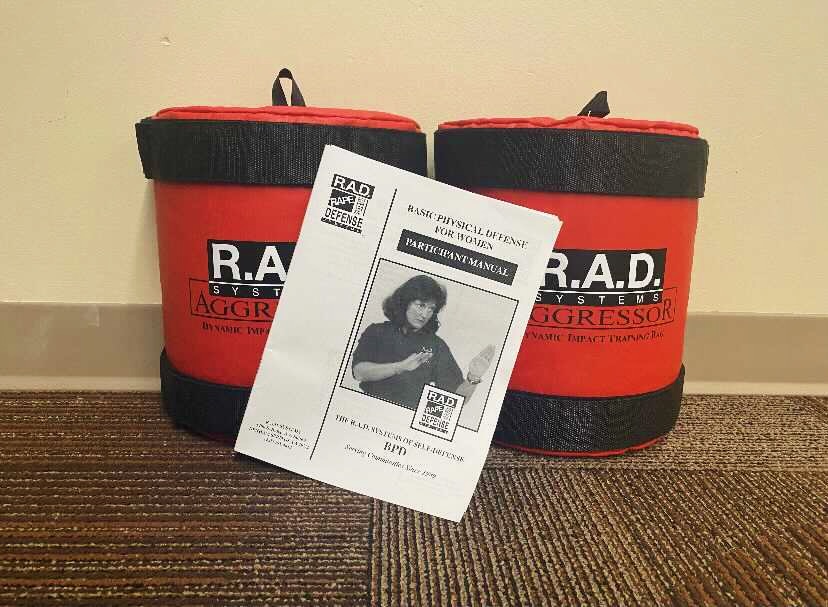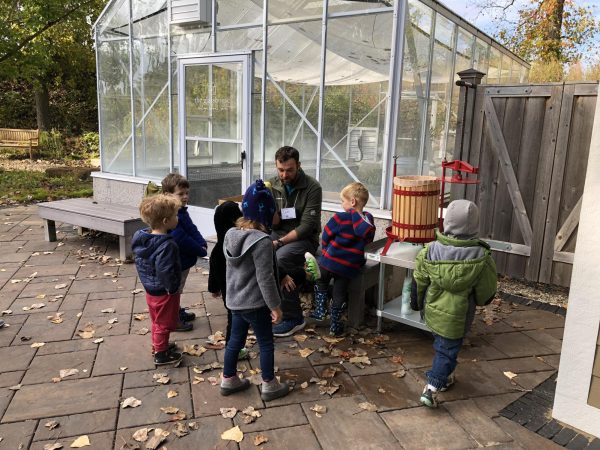Rape Aggression Defense Program equips women for life
TW: This story references sexual violence.
“It’s important that people know that this program is being offered. It’s an investment of $30 for the first 12 hours, but it’s a program that they can come back to for the rest of their lives. It’s free for life,” Campus Safety Director William Corner said of Calvin’s Rape Aggression Defense program, known as R.A.D., which he launched through Campus Safety in 2016.
Corner’s background as a private investigator and police officer prompted him to advocate for sexual violence prevention, specifically gender-based violence prevention, on Calvin’s campus. The program, which uses the curriculum from a national program called Rape Agression Defense Systems, provides women in the Calvin community with the chance to improve basic safety skills, and to learn physical defense tactics needed to prepare them for vulnerable situations.
After months of preparation and training a team of 11 instructors, the first R.A.D. session launched in 2017 and continued annually until the pandemic put a pause on program offerings in January of 2020.
R.A.D. is back in full force a year and a half later. The program resumed this October, with a lineup of four three-hour sessions on Tuesdays and Wednesdays throughout the course of the month in Hoogenboom 280. Participants who pay the $30 program fee receive a workbook, basic safety education and one-on-one self-defense physical training.
About R.A.D
The program is a result of a nation-wide initiative to combat cases of sexual violence on college campuses. To further this goal in Michigan, the Michigan State Police established the Campus Sexual Assault Grant Program in 2016. The grant, offers financial assistance to incorporate sexual violence prevention programming on campuses. Calvin was awarded $32,750 of the $500,000 awarded in 2016 as a result of Calvin’s “Safer Spaces: Coordinating Education and Campus Services for the Reduction of Sexual Assault at Calvin College” project.
Campus Safety invested $15,000 of the grant into developing their own branch of the Rape Aggression Defense program to tap into the educational component of their proposed initiative.
This effort to prevent sexual violence on college campuses is not without cause. According to RAINN, 26.4 percent of females and 6.8 percent of males are victims of rape or sexual assault by physical force during their undergraduate years. Female students aged 18 to 24 are three times more likely to be victims of sexual violence during their undergraduate and graduate years. Among graduate and professional students, 9.7 percent of females and 2.5 percent of males are victims of physical rape or sexual assault.
Rape Aggression Defense Systems, founded in 1989, is the only program of its kind to receive endorsement from organizations such as the International Association of Campus Law Enforcement Administrators and National Academy of Defense Education with programs in every state as well as several countries outside of the United States.
A focus on self-defense
“We thought it would be good to have a women’s self-defense program and give women tools of things in terms of knowledge to protect themselves outside of physical defense: developing awareness, thinking about your safety plans and those kinds of tools that really everyone should have to protect themselves,” said Corner. “With that grant money, we were able to start our first iteration of the R.A.D. program.”
Corner was hopeful, though, that the R.A.D. program will one day be extended to men on campus after the women’s program stabilizes and more financial aid is provided to the program through expanded financial support from another grant or Calvin’s administration.
Corner was responsible for recruiting a team of instructors to help him teach the sessions. Though he had considerable freedom in recruiting, he followed two clear standards when assembling his team: instructors must be either staff or faculty, and there must be a significant percentage of female instructors.
“We try to have a team of men and women offering the instruction, or it can be all women. I never want it to be a full team of men, especially for a women’s self defense class,” Corner said.
One of the female instructors in the program is Emily Taylor, assistant director of Building Services.
“I didn’t have any experience with self defense prior to this. That was the first thing that I really put myself out there at Calvin to do … that was the first major step I took at doing something for the community here,” Taylor said.
Taylor trained with Corner and other instructors for approximately 30 hours over three days to obtain Rape Aggression Defense Systems’ basic trainer certification. Corner and other instructors spent an additional 30 hours receiving aggressor training certifications in order to provide simulations throughout the sessions. According to Taylor, the needed training provided by Rape Aggression Defense Systems is critical to the program’s success at Calvin.
“The trainers that came and worked with us are amazing … they’re invested. It’s not like one of those major huge companies; it’s a few people who run it and come out and teach instructors to make sure things are going well,” said Taylor.
Taylor recognized the importance of having both female and male instructors teaching the sessions. “Women are more comfortable hearing from women. But I do think it’s important to have the men there as well. It’s good for the participants to hear ‘this actually hurts’ … when they’re wearing all this thick padding and hear that what they are doing actually hurts, it’s empowering,” she said.
Five years later, Taylor continues to tap into her passion for safety education at R.A.D. sessions held at Calvin as an instructor. This year, she is teaching sessions with approximately twelve participants; participants are mostly made up of Calvin students, ranging from freshmen to seniors. This year’s participants also include Calvin alumni who are accompanying their daughters.
The training sessions
Participants are welcomed with the R.A.D. participant manual, which serves as a visual complement to the different features in the session.
Once paperwork is completed, instructors introduce themselves and reassure participants of the space’s safety. Participants are encouraged to leave if they feel triggered at any moment, and they are allowed to create physical boundaries when it comes time for physical training; participants can determine how involved they want to be in the session.
After a lecture-style introduction to the core ideas of the course, as well as statistics and tips to maintain overall safety, the physical training begins. Over an hour and a half is spent learning and performing self-defense techniques that get progressively more intense as the program develops. A lead instructor thoroughly explains the physical moves as two additional instructors demonstrate the moves visually.
Following the explanation of each technique, the participants are given the opportunity to practice. Two instructors put on protective equipment, allowing the women to strike something while practicing. Each participant is given the option of hitting the teachers physically, but they can decline if they are called upon. Participants who are not striking instructors physically are encouraged to develop their abilities individually.
Each technique is practiced five to six times, with participants instructed to repeat each move while yelling “no” in a loud, booming voice. “I wanna hear you use your voices. That’s an important piece of protecting yourself,” Corner told his Wednesday night class. Class is concluded with a debrief and a period for asking questions.
In the eyes of those involved in the program, R.A.D. is more than a four-week program.
“It sets you up for keeping yourself safe and empowering you for the rest of your life. This is a good age to learn. It goes into everything you need to do in your life,” said Taylor.
Erica Shire, a first-time instructor for the R.A.D. program, believed that the university owes it to its students to provide this training throughout their time at Calvin and hoped that other universities will follow suit. “There’s nothing more important for a university to do than to offer resources for women to defend themselves,” Shire said.
Corner hoped that as the program continues, more offerings for participants and funding can be made available to expand the program. Taylor recognized the importance of having access to the program beyond Calvin. “I’m hoping that we can expand this program into the Grand Rapids area. Offering it in high schools, community centers. Everyone needs to know this, this stuff matters.”
If you or someone you know is facing sexual violence at Calvin, there are options available for guidance and assistance, including as campus safety, the center for counseling and wellness, and safer spaces.








